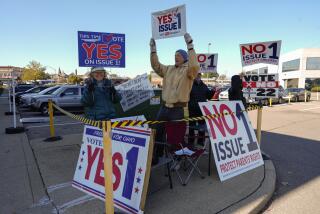Tough Laws, High Insurance Drive Doctors Away From West Virginia
- Share via
CHARLESTON, W. Va. — Dr. Sherif Awadallah came two years ago to set up a program in reproductive endocrinology at Charleston Area Medical Center.
Last summer, Awadallah pulled up stakes and went back to Ohio, joining an exodus of doctors who say an indifferent Legislature and a hostile insurance industry make West Virginia a grim place to practice medicine.
“It’s complicated,” he said. “There was a lot for me to do there. If I wasn’t married with children I probably would have stayed. But concerns about the regional economy, plus problems with insurance--that’s a double whammy.”
A decline in doctors, a national trend, has been worse in West Virginia in recent years, threatening gains in medical care made since the 1960s.
In 1989, more than 80 doctors stopped practicing in West Virginia, according to a legislative task force, and fewer are settling here. The state Medical Board licensed 318 new doctors in 1989, down from 346 last year and 414 in 1987.
The Charleston Area Medical Center had three applicants for every opening in its residency program a decade ago. Today, 22 of 118 slots are unfilled. And although 23% of the students at West Virginia’s three medical schools come from out of state, nearly 35% won’t stay once they have graduated.
Those trends have left the state with 152 doctors per 100,000 residents, 37th among the states and well below the national average of 189, according to the American Medical Assn. Some counties have no doctors at all.
“Some of the good people that you want standing over you in surgery are leaving,” said Dr. Phil Branson, an orthopedic surgeon in Princeton. “At this point I am watching how things go.”
Many of West Virginia’s 3,000 doctors blame the state’s political leadership, which they say traditionally has lagged in controlling medical costs and protecting doctors from excessive malpractice awards. The Legislature last year moved to control runaway medical costs. Lawmakers say those measures may drive doctors away temporarily but ultimately will make going to the doctor less painful for everyone; most doctors say the law only deepened the crisis.
“The state has never maintained good control of its health care costs,” said Dr. Richard Capito of Thomas Memorial Hospital in South Charleston and a member of the Legislative Task Force on Uncompensated Health Care.
“When corporate America was forming HMOs and PPOs and holding down costs, West Virginia was an open book--you charge us and we’ll pay it,” said Capito, a native of Weirton who graduated from West Virginia University Medical School.
Health Maintenance Organizations and Preferred Provider Organizations are groups aimed at reducing health care costs through an agreement with a captive group of doctors or hospitals, guaranteeing income in return for discounts.
Doctors and lawmakers also blame federal programs in the 1960s that brought care to isolated areas where people were too poor to pay for it. One-third more doctors practice here than in the mid-1970s, and the infant death rate has been halved since 1960, according to the Department of Health and Human Services.
But many doctors say they aren’t paid enough, and most say they sometimes aren’t paid at all. A West Virginia State Medical Assn. report said that doctors write off $142 million in health care each year.
High malpractice rates also scare away young doctors, said Capito, who belongs to a group of emergency care doctors that contracts services to Thomas Memorial. Each doctor pays $20,000 in annual malpractice premiums; one who left and moved to South Carolina now pays $2,000 a year for similar coverage because that state has set up a joint underwriting association for doctors.
The Omnibus Health Care Act, which went into effect in July, averted a $100-million financial crisis by controlling how much the state spends on care.
But many doctor say the main features--fee caps and requiring doctors and hospitals who see state-insured patients to have 15% covered by Medicaid--will only make things worse. Lawmakers argue that the state had to act to head off a fiscal crisis that would have jeopardized the entire budget.
“It’s a piece of the answer, a step in the right direction,” said Del Pat White, the administrator of a clinic and a leader of two legislative health care committees, who has been meeting with doctors to discuss possible changes in the bill in the coming session.
“In the past there wasn’t that dialogue,” said George Rider, the West Virginia Medical Assn.’s executive director.
Advocates for the poor occupy a middle ground between doctors and legislators, so they haven’t been key players in making health care policy, said Charles Tindley, coordinator of the Mountain State Health Care Campaign.
“To me it’s a real attitude of selfishness,” said Tindley. “The doctors have become so hostile that they think anyone on the so-called other side is their enemy. The enemy is poor health care.”
Rider applauded the governor for appointing the association’s chief to a task force studying how medical schools can help keep doctors in the state.
Not all Rider’s 2,300 members are so optimistic. Task force recommendations aren’t due until August, long after the end of the legislative session. And even then, doctors don’t pull much weight in the Legislature, Rider said.
“In dealing with the Legislature in the last three or four years, there’s been little open-mindedness to listen to the medical community,” Capito said. “The health care act affects one-quarter of the state’s population, but there was not a single practicing physician consulted.”
The consensus among doctors is that lasting solutions won’t come easy.
“The Omnibus Act is a problem, but as an isolated problem it wouldn’t be such a big deal,” said Awadallah, who now practices in Cincinnati. “It’s gratifying to practice where people really need you, but for physicians it’s a long-term economic picture.”
Universal health care would save the state money and help with the problem of uncompensated health care, analysts say. But doctors say such a plan would likely drive them away by imposing caps on the price of procedures.
Insurance reform will mean making lawmakers face up to one of the state’s most powerful industries. Doctors also face the possibility of changing the way they practice--doing fewer tests, for example--to lower fees.
“A realistic solution is politically unpopular,” Branson said. “It involves a lot of sacred cows.”
More to Read
Sign up for Essential California
The most important California stories and recommendations in your inbox every morning.
You may occasionally receive promotional content from the Los Angeles Times.













